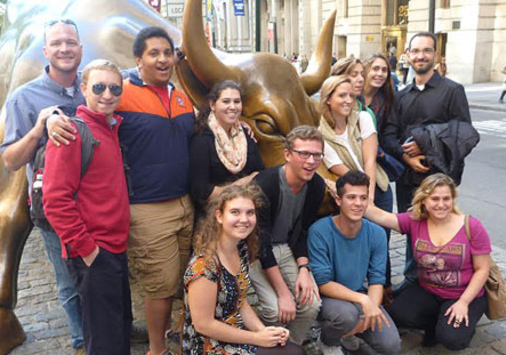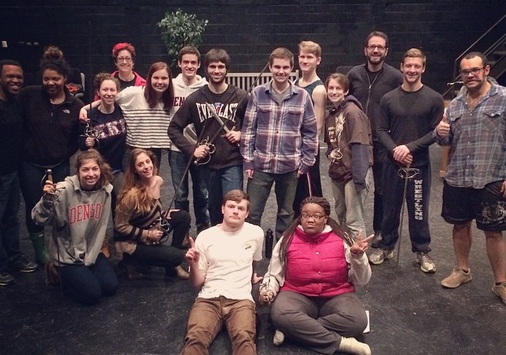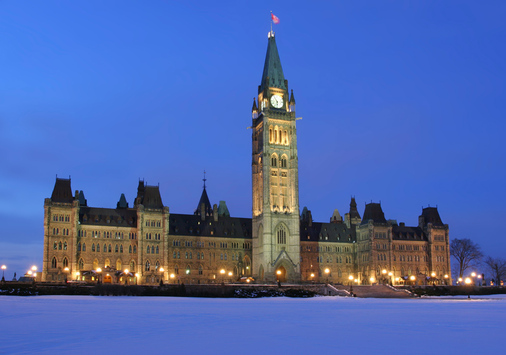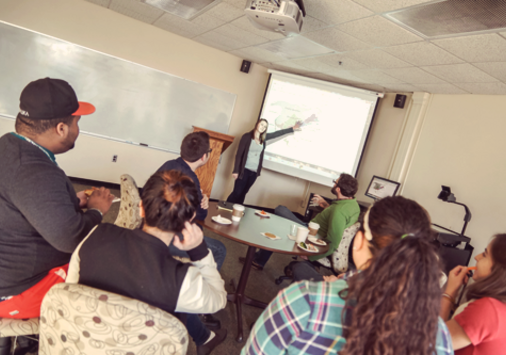Courses
2024 - 2025
For this academic year's course catalog, please visit our Academic Catalog site. For courses currently offered, please refer to the Schedule of Classes.
Denison Seminars are classes that engage 8 - 16 highly motivated sophomore and junior students in interdisciplinary, extradisciplinary, or integrative topic(s) that transcend traditional departmental, programmatic, and/or divisional boundaries. Denison Seminars are liberal arts courses that are directed to a broad and diverse students audience. These classes require no prerequisites and have no other structural limitations. Each Denison Seminar satisfies a divisional GE requirement based on the instructor's home division.
Denison Seminars are classes that engage 8 - 16 highly motivated sophomore and junior students in interdisciplinary, extradisciplinary, or integrative topic(s) that transcend traditional departmental, programmatic, and/or divisional boundaries. Denison Seminars are liberal arts courses that are directed to a broad and diverse students audience. These classes require no prerequisites and have no other structural limitations. Each Denison Seminar satisfies a divisional GE requirement based on the instructor's home division. DS 251 also counts toward major/minor requirement in the instructor's home Department.
Past Denison seminars have included a variety of topics, such as:
Soccer is played on neighborhood streets, recreational fields & in large stadiums. It is often referred to as a “universal language”, where people who are different can collaborate in a common purpose. This course will examine soccer as a cultural practice & as a portal for exploring the political, gender, & racial issues that shape the global game. There is a semester-long playing and training component (lab) to this class, and a committed engagement with playing soccer is a required, regular part of this course. Formal soccer playing experience is not required, but is recommended. Players are required to have proper footwear and safety equipment. There will be a trip to Costa Rica during Spring Break, where students will train, play matches, attend formal seminars on the social dynamics of soccer, as well engage in a service project.
People have moved to cities in search of economic and cultural opportunities, but at the same time, urban growth has often been associated with contestation over space, including cultural and economic segregation, informal and precarious living conditions. The spectacular rise of what Saskia Sassen calls “global cities” has prompted broad interdisciplinary inquiry into the cultural and political dynamism and socioeconomic challenges of cities across the world. This course, co-taught by two East Asian Studies faculty members, a sociocultural anthropologist specialized in transnational migration and social movements and a historian of art and urban landscape, investigates intersections of art, architecture and place-making in Hong Kong, a paradigmatic high-density global city in East Asia that stands at the cross-roads of histories of empire, colonization, migration and globalization. This course engages interdisciplinary (ethnographic and visual studies) methods and theories to interrogate some of the promises and dilemmas various social groups face in global cities, and ask how they intersect with and confront each other in the shared or ‘public’ spaces of Hong Kong’s urban environment. To explore these issues, the students will study and critically assess a representative selection of materials that address the creation and contestation of urban space through the lenses of colonial and post-colonial governance, globalization, migration, cultural and ethnic identity and economic inequality, art, architecture and cultural heritage, and community and environment activism. The course seeks to establish Global Course Connection with Dr. Iam-Chong Ip of the Department of Cultural Studies at Lingnan University in Hong Kong. By partnering with Dr. Ip, who has expertise in urban politics, representation, and media activism, the course will benefit from his disciplinary expertise and knowledge about urban issues in Hong Kong, and from shared course assignments between his course at Lingnan and this seminar. Through GCC, the students will develop collaborative research projects on a site of choice. The course will culminate in mid-May 2019 with the group field trip to Hong Kong for 7 days, where we will meet with social and environmental activists (e.g., community advocates, immigrant rights advocates), local communities, scholars, artists, visit local art centers and museums, and apply Fine Arts and ethnographic methods to explore key urban landscapes.
Yoga has become increasingly mainstream in North America and Europe in the past several decades. It seems, however, to mean many things to many people, raising the question: What is yoga in its contemporary global setting? Is it a form of physical exercise aimed at bodily and mental health and reduction of stress? An ancient Hindu mental and bodily discipline aimed at spiritual liberation? An Indian philosophy with a distinct ontology, epistemology, and worldview? An experiential set of bodily and mental exercises providing new insights into the workings of the mind and body at the neurological level? A growing new area of commodity capitalism? Is it a form of spiritual practice devoid of inherent content that can be incorporated into other religious traditions, such as Christian Yoga? Is it a cultural practice misappropriated by the West? Examining the multifaceted phenomenon of yoga also allows us to investigate a number of philosophical questions including what the nature of practice is; how a tradition is constituted; how we should understand consciousness, the mind-body relationship, and embodiment; and how to conceptualize cultures. We will approach the question “What is yoga?” from a deeply interdisciplinary perspective. Answering it involves areas of inquiry as varied as neuroscience and therapeutic counseling, philosophy of mind, religious studies, performance studies, globalization theory, political economy and post-colonial studies. In addition to a theoretical and text-based approach, this course will include an applied component in the form of a weekly “yoga lab,” giving students the opportunity to experience and explore yoga from their own embodied perspective. No prior experience in yoga is required.
This course will examine different manifestations of creativity and its interpretations and possible effects in the Hispanic world. The seminar will focus on three themes: a) art and its relation to the subject, b) art as a social force and c) art as utopia and healing. Students will practice articulating their own space in the world through the creation of literary and artistic pieces in dialogue with the models provided in this course. Students will also develop the ability to formulate critical discourses to analyze and evaluate creativity in the visual arts and literature.
Class TRAVEL: Students will experience firsthand the importance of creativity in the Hispanic world by traveling to La Habana, Cuba during Spring break. There, students will interview artists, writers and specialists studied in class.
Humans seemingly always have been both enthralled and terrified of wilderness. What is it about feeling “wild” that entangles us with a seemingly truer sense of our truest selves? How do we balance the need to preserve and conserve wild things with our seemingly unquenchable thirst for progress, innovation, expansion, and dominion? Can we live without wilderness? What will happen to us—all of us—if we no longer have wilderness? This course will take seriously what wilderness means and the different ways those meanings—across diverse social, political, ecological, and aesthetic contexts—suggest ways for better understanding ourselves, our society, and the intertwined threads of the wild and the human. As part of this serious consideration of wilderness, we will read (and view and listen) deeply and widely to works concerned with exploring questions and issues through such lenses as memoir, screen, long-form audio, and canvas. We will survey fields as diverse and different as literature, religion, history, psychology, ecology, and art. This course will include travel during two days of fall break (Oct 16-17) to a regional backpacking destination. We will also travel to a wilderness area in Arizona during November 18-22 (the first half of Thanksgiving break). Students must be able to participate in both trips. Fee: Enrolled students will be charged a fee of $530 for associated course expenses. The fee will be waived automatically for students with significant financial need as determined by the Financial Aid office. Contact Associate Provost Catherine Dollard with fee-related questions. Note: Course meets the social science elective requirement for Environmental Studies majors / minors.
This course will explore puppetry as a theatre form with deep roots in many cultural traditions, and as a prompt for the design and creation of visual objects that, when animated by a human actor, come to life. Through the course, students will make several different types of puppets and will become familiar with the ways a puppeteer creates the illusion of the puppet as a “living” being. A paradox will underlie our exploration: In what ways is the puppet both utterly simple/basic and utterly versatile/nuanced/sophisticated? Visiting guest artists and a trip to the Center for Puppetry Arts in Atlanta will demonstrate the rich cultural heritage and myriad possibilities of puppets. Ultimately, students will create all elements of a 15 minute puppet performance: conceiving of the characters and narrative, recording the audio, designing and building the scenic environment, and envision, engineer, and engage the puppet characters (making, rehearsing, and animating the puppets in live performance before an audience). In creating this performance, students will develop not only creative abilities, but also broad project management and communication skills. This course will include required travel during fall break (Oct 14-17, 2023) to the Center for Puppetry Arts in Atlanta. Fee: Enrolled students will be charged a fee of $530 for associated course expenses. The fee will be waived automatically for students with significant financial need as determined by the Financial Aid office. Contact Associate Provost Catherine Dollard with fee-related questions. Note: Course meets an Emphasis requirement in the Theatre major.










